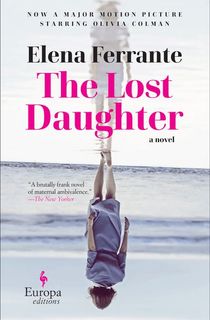
The Lost Daughter
Leda, a middle-aged divorcée, is alone for the first time in years after her two adult daughters leave home to live with their father in Toronto. Enjoying an unexpected sense of liberty, she heads to the Ionian coast for a vacation. But she soon finds herself intrigued by Nina, a young mother on the beach, eventually striking up a conversation with her. After Nina confides a dark secret, one seemingly trivial occurrence leads to events that could destroy Nina’s family in this “arresting” novel by the author of the New York Times–bestselling Neapolitan Novels.
“Although much of the drama takes place in [Leda’s] head, Ferrante’s gift for psychological horror renders it immediate and visceral.” —The New Yorker
More Elena Ferrante Books

My Brilliant Friend
Beginning in the 1950s in a poor but vibrant neighborhood on the outskirts of Naples, Elena Ferrante’s four-volume story spans almost sixty years, as its main characters, the fiery and unforgettable Lila and the bookish narrator, Elena, become women, wives, mothers, and leaders, all the while maintaining a complex and at times conflicted friendship. This first novel in the series follows Lila and Elena from their fateful meeting as ten-year-olds through their school years and adolescence.
Through the lives of these two women, Ferrante tells the story of a neighborhood, a city, and a country as it is transformed in ways that, in turn, also transform the relationship between two women.
“An intoxicatingly furious portrait of enmeshed friends.” —Entertainment Weekly

The Story of a New Name
The follow-up to My Brilliant Friend, The Story of a New Name continues the epic New York Times–bestselling literary quartet that has inspired an HBO series, and returns us to the world of Lila and Elena, who grew up together in post-WWII Naples, Italy.
In The Story of a New Name, Lila has recently married and made her entrée into the family business; Elena, meanwhile, continues her studies and her exploration of the world beyond the neighborhood that she so often finds stifling. Marriage appears to have imprisoned Lila, and the pressure to excel is at times too much for Elena. Yet the two young women share a complex and evolving bond that is central to their emotional lives and a source of strength in the face of life’s challenges. In these Neapolitan Novels, Elena Ferrante, “one of the great novelists of our time” (The New York Times), gives us a poignant and universal story about friendship and belonging, a meditation on love and jealousy, freedom and commitment—at once a masterfully plotted page-turner and an intense, generous-hearted family saga.
“Imagine if Jane Austen got angry and you’ll have some idea of how explosive these works are.” —The Australian

Those Who Leave and Those Who Stay
In the third book in the New York Times–bestselling Neapolitan quartet that inspired the HBO series My Brilliant Friend, Elena and Lila have grown into womanhood. Lila married at sixteen and has a young son; she has left her husband and the comforts her marriage brought and now works as a common laborer. Elena has left the neighborhood, earned her college degree, and published a successful novel, all of which has opened the doors to a world of learned interlocutors and richly furnished salons. Both women are pushing against the walls of a prison that would have seen them living a life of misery, ignorance, and submission. They are afloat on the great sea of opportunities that opened up for women during the 1970s. And yet, they are still very much bound to each other in a book that “shows off Ferrante’s strong storytelling ability and will leave readers eager for the final volume of the series” (Library Journal).
“One of modern fiction’s richest portraits of a friendship.” —NPR
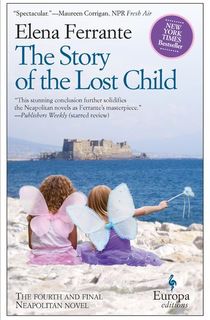
The Story of the Lost Child
The Story of the Lost Child concludes the dazzling saga of two women, the brilliant, bookish Elena and the fiery, uncontainable Lila, who first met amid the shambles of postwar Italy. In this book, life’s great discoveries have been made; its vagaries and losses have been suffered. Through it all, the women’s friendship remains the gravitational center of their lives.
Both women once fought to escape the neighborhood in which they grew up. Elena married, moved to Florence, started a family, and published several well-received books. But now, she has returned to Naples to be with the man she has always loved. Lila, on the other hand, never succeeded in freeing herself from Naples. She has become a successful entrepreneur, but her success draws her into closer proximity with the nepotism, chauvinism, and criminal violence that infect her neighborhood. Yet, somehow, this proximity to a world she has always rejected only brings her role as unacknowledged leader of that world into relief.
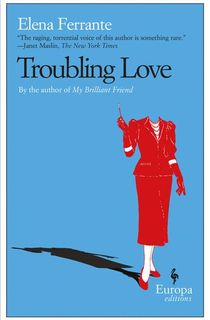
Troubling Love
Following her mother’s untimely and unexplained drowning, which was preceded by a series of strange phone calls, forty-five-year-old Delia leaves Rome and embarks on a voyage of discovery through the beguiling yet often hostile streets of her native Naples. She is searching for the truth about her family and the men in her mother’s life, past and present, including an abusive husband. What she discovers will be more unsettling than she imagines, but will also reveal truths about herself, in this psychological mystery marked by “tactile, beautifully restrained prose” (Publishers Weekly) about mothers and daughters and the complicated knot of lies and emotions that binds them.
“Ferrante’s polished language belies the rawness of her imagery.” —The New Yorker
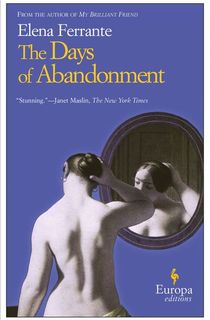
The Days of Abandonment
Following her mother’s untimely and unexplained drowning, which was preceded by a series of strange phone calls, forty-five-year-old Delia leaves Rome and embarks on a voyage of discovery through the beguiling yet often hostile streets of her native Naples. She is searching for the truth about her family and the men in her mother’s life, past and present, including an abusive husband. What she discovers will be more unsettling than she imagines, but will also reveal truths about herself, in this psychological mystery marked by “tactile, beautifully restrained prose” (Publishers Weekly) about mothers and daughters and the complicated knot of lies and emotions that binds them.
“Ferrante’s polished language belies the rawness of her imagery.” —The New Yorker

Incidental Inventions
Collected here for the first time are the seeds of future novels, the timely reflections of this internationally beloved storyteller, the abiding preoccupations of a writer who has been called “one of the great novelists of our time” (The New York Times).
“This is my last column, after a year that has scared and inspired me . . . I have written as an author of novels, taking on matters that are important to me and that—if I have the will and the time—I’d like to develop within real narrative mechanisms.”
With these words, Elena Ferrante bid farewell to her year-long collaboration with the Guardian newspaper. For a full year, she wrote weekly articles, the subjects of which had been suggested by Guardian editors, making the writing process a sort of prolonged interlocution. The subjects ranged from first love to climate change, from enmity among women to the experience of seeing her novels adapted for film and TV.

Frantumaglia
The writer known as Elena Ferrante has taken pains to hide her identity in the hope that readers would focus on her body of work. But in this volume, she invites us into Elena Ferrante’s workshop and offers a glimpse into the drawers of her writing desk—those drawers from which emerged her three early standalone novels and the four installments of the Neapolitan Novels, the New York Times–bestselling “enduring masterpiece” (The Atlantic).
Consisting of over twenty years of letters, essays, reflections, and interviews, it is a unique depiction of an author who embodies a consummate passion for writing. In these pages, Ferrante answers many of her readers’ questions. She addresses her choice to stand aside and let her books live autonomous lives. She discusses her thoughts and concerns as her novels are being adapted into films. She talks about the challenge of finding concise answers to interview questions. She explains the joys and the struggles of writing, the anguish of composing a story only to discover that that story isn’t good enough. She contemplates her relationship with psychoanalysis, with the cities she has lived in, with motherhood, with feminism, and with her childhood as a storehouse for memories, impressions, and fantasies. The result is a vibrant and intimate self-portrait of a writer at work.
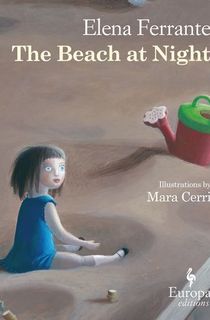
The Beach at Night
Readers of Elena Ferrante’s The Lost Daughter may recall the little doll—lost or stolen—around which that novel revolves. Here, Ferrante retells the tale from the doll’s perspective.
Celina is having a terrible night, one full of jealousy for the new kitten, Minù; feelings of abandonment and sadness; misadventures at the hands of the beach attendant; and dark dreams. But she will be happily found by Mati, her child, once the sun rises . . .
A “beautifully written” dark fable from a doll’s point of view—by the New York Times–bestselling author of The Lost Daughter and the Neapolitan Novels (The Washington Post).
